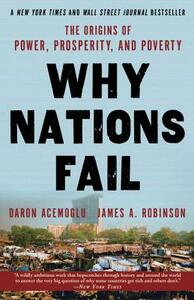Take a photo of a barcode or cover
695 reviews for:
Why Nations Fail: The Origins of Power, Prosperity, and Poverty
Daron Acemoğlu, James A. Robinson
695 reviews for:
Why Nations Fail: The Origins of Power, Prosperity, and Poverty
Daron Acemoğlu, James A. Robinson
One of the clearest explanations I have ever read for why there exists large differences in prosperous and poverty stricken countries in our world. Perhaps one weak point of the book is that the author never addresses what rule the morality of rulers plays in the downfall or success of countries. But overall an excellent book, and one I would highly recommend.
challenging
informative
reflective
slow-paced
Why Nations Fail dives into the reasons why economic inequality is so common in the world today and identifies that poor decisions of those in political power are the main reason for unfairness rather than culture, geography, climate, or any other factor.
The authors bring up the theory of extractive institutions vs inclusive institutions as the reason some nations succeed and others don't.
informative
slow-paced
The thesis could have been distilled in maybe one eighth of the pages. The theory provides a useful framework for considering present day inequality between countries, but can be somewhat loose with the term “inclusive economic institutions”, in the sense that it seemed to champion capitalism without acknowledging that its modern form may ultimately prove as unsustainable as growth under extractive institutions
Amazing book that has great examples of how nations fail and why. A great synopsis to refer to for the general reader.
challenging
informative
slow-paced
4.5/5
“The central thesis of this book is that economic growth and prosperity are associated with inclusive economic and political institutions, while extractive institutions typically lead to stagnation and poverty.”
Great thesis with an over-extensive amount of historical research to back it up. Seems to be in line with Amartya Sen’s social welfare theories, but more readable for the layman. Highly recommend.
“The central thesis of this book is that economic growth and prosperity are associated with inclusive economic and political institutions, while extractive institutions typically lead to stagnation and poverty.”
Great thesis with an over-extensive amount of historical research to back it up. Seems to be in line with Amartya Sen’s social welfare theories, but more readable for the layman. Highly recommend.
Que forma tan increible de plasmar una síntesis de hechos históricos para darle respuesta a tan enigmatico interrogante
Had to read this for a class and didn't really seemed that interesting since it is not something that I would normally go for but it really was a surprisingly good and interesting read. I got to learn about things that I wouldn't have otherwise and really opened me up to the different theories on the successfulness of a nation.


